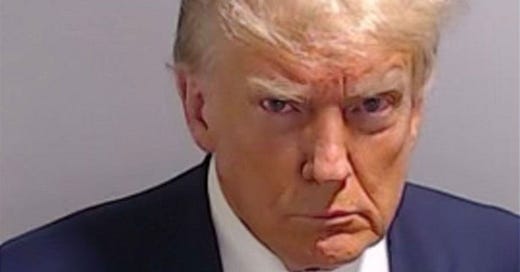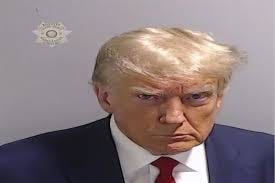Political Prosecutions
Donald Trump asserts the prosecution pending against him for challening the 2020 Presidential election is politically motivated. Can prosecutions BE politically motivated?
Not only did Thomas Jefferson introduce the notion of justice to criminal prosecutions but he was one of the pioneers who brought politics into federal criminal prosecution. As Secretary of State, he oversaw the prosecution of Gideon Henfield for violating United States neutrality in a war between France and Great Britain. As President, he made adherence to republican principles a litmus test for appointment as United States Attorney. Since Jefferson, politics and federal criminal prosecution have had a contentious relationship.
In his October 23rd motion to dismiss, former President Donald Trump asked the court to dismiss the criminal charges against him on the basis of selective and vindictive prosecution. His motion claims, among other things, that President Joe Biden “was making sure [Donald Trump] would not become the next President again.” (Mot. To Dismiss, p2). The motion cites a New York Times article claiming “as recently as late last year [2021], Mr. Biden confided to his inner circle that he believed former President Donald J. Trump was a threat to democracy and should be prosecuted…” (Mot. To Dismiss, p3). In essence, former President Trump argues that President Biden instigated these charges for political gain as former President Trump appears to be President Biden’s opponent in the 2024 Presidential Election.
Among the questions this motion raises is the role that politics plays in federal criminal prosecution. To answer this question we need to define the term “politics.” When most people use it, especially in today’s charged environment, they mean partisan politics. Does the action benefit “my” party and/or does it hurt the “other” party? However, this is not the only possible application. When we talk about the relationship between politics and federal criminal prosecution, we must look beyond simply partisan politics.
Politics can affect federal prosecutions in four ways. First, politics relates to policy implementation. Second, politics influences those selected for federal prosecutorial positions. Third, federal prosecutors can use their authority to protect partisan interests. In this sense, declining prosecution can prevent harm befalling a political ally. Finally, federal prosecutors can use their discretionary authority to target political enemies. Former President Trump argues President Biden employed this method and that necessitates dismissal of the case against former President Trump.
Of these four methods, implementing policy agendas through prosecution is most palatable. We hold elections for a reason. Different political parties have different policy agendas. When a party’s candidate is elected, there is presumably a mandate to implement its policy agenda. High-level, presidentially-appointed prosecutors can decide which crime categories they will emphasize and which will receive fewer resources. Based on research I conducted with Thomas Dearden, Republican presidents emphasize violent crime while Democrats emphasize white collar offenses. (Ingram and Dearden, 2019). While we may have personal preferences, we cannot reasonably complain when one party emphasizes one type of crime versus another.
To enact these policy preferences, those elected must identify people who support the policy. Presidents, when elected, must appoint thousands of people. This includes the Attorney General, numerous assistant Attorneys General, and 93 United States Attorneys. Understandably, part of the selection process is identifying people who share the President’s policy agenda. It would not make much sense, for example, for President Biden to appoint former Attorney Generall Bill Barr as Biden’s Attorney General. Barr’s conservative ideology would conflict with Biden’s liberal agenda. Instead, Biden selected Merrick Garland as Attorney General and Lisa Monaco, as Deputy; two people who more closely align with Biden’s agenda. While we largely can agree this is an acceptable use of politics, there are limits.
During the Trump Administration’s struggle to overturn the 2020 election, President Trump attempted to install Jeffrey Clark into the Attorney General post. Trump believed Clark would support Trump’s efforts to bring legal action, in the name of the United States, to reverse the election results. Trump’s attempt failed as others in the Administration believed the legal action was unwarranted. This use of loyalty crossed a line, however.
It crossed the line not because of the use of loyalty but because of actions to be taken. The use of prosecutorial discretion as a partisan political weapon, be it to protect or to undermine, crosses the appropriateness line for utlizing politics in prosecutorial decision-making. It crosses the line because politics becomes the determining factor in a specific matter versus its use to determine and implement policy priorities.
When using prosecution as a political weapon, it targets a person because of that person’s political position or beliefs. One early use of this was prosecutions under the Alien and Sedition Acts in the late 1790s. President John Adams and other Federalist officials and judges prosecuted Republicans who criticized Federalists. Their aggressive pursuit of Republicans was a key factor to Jefferson becoming president in 1801.
Using proseuction as a political shield protects political allies. Like the use of prosecutorial discretion as a weapon, using discretion as a shield makes partisan politics a deciding factor, instead of evidence strength. For example, in the wake of the Iran-Contra scandal in the 1980s, the Reagan Administration did not pursure criminal prosecutions. Instead, an independent counsel was appointed to prevent the continued use of federal prosecution as a political shield.
Neither of these uses of partisan politics is accompanied by a bright line so the public can assess if it has occurred. Every prosecution of a public official by the opposing party is subject to claims of partisan influence. Is the ongoing case against Republican New York Representative George Santos politically motivated? Thus far, there are no credible claims of it. When the Trump Administration began investigating Hunter Biden, Joe Biden’s son, there were claims of political motivations. Yet, it turns out, that probable cause exists to believe Hunter Biden violated federal law. Does that mean the prosecution was not politically motivated?
Ultimately, the question of whether a case is justificed versus an episode of political prosecutorial vindictiveness depends upon the evidence of criminal conduct and how those in similar circumstances are treated. If the person has, in fact, committed a federal offense, does the motivation behind the prosecution matter? The answer to that requires examining similarly situated people who were or were not prosecuted. If the charge is something that a Republican Administration only prosecutes Democrats for committing while ignoring Republican violations, then the political motivation matters. Conversely, if the Republican Administration prosecutes violators of both parties, it seems more palatable even if it means a powerful Democratic officer holder is prosecuted.
This is where former President Trump’s claim will fall short. He is in a category of one as the only former President prosecuted by a subsequent administration. No sitting President had ever engaged in such conduct before. As a result, he cannot possibly show that his prosecution is selective or vindictive. While there may be political motivations behind the prosecution, no one can say, if the situation was reversed, that the case would not be pursued.
I hope you enjoyed this issue and that it made you stop and think. I would love to hear any comments, questions, concerns, or criticisms that you have. Leave a comment or send a message! Also, if you enjoyed this or if it challenged your thinking, please subscribe and share with others!
Sources
Scott Ingram and Thomas Dearden, Turning the Ship of State: Presidents, Politics and Prosecutorial Priorities, 1942-2018, paper presented at the American Society of Criminology Conference, November 2019.
Scott Ingram, “George Washington’s Attorneys: The Political Selection of United States Attorneys at the Founding” 39 Pace Law Review 163 (2018).





Clear and useful!